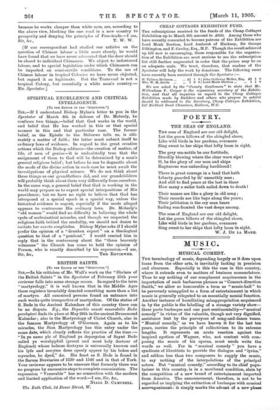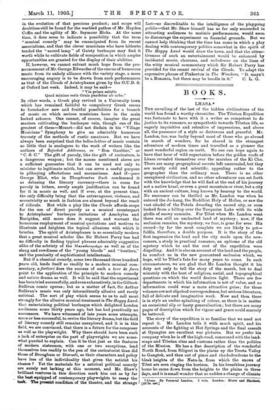THE terminology of music, depending largely as it does upon
loans from the other arts, is inevitably lacking in precision and clearness. Especially is this the case in this country, where it extends even to matters of business nomenclature. Thus to say nothing of our complacent acquiescence in the importation of such barbarous phrases as "Concert-direction Smith," we allow so honourable a term as " music-hall " to be perversely misapplied to a form of entertainment in which music is generally relegated to an essentially menial function. Another instance of humiliating misappropriation acquiesced in by the public is the labelling of a strange variety show— three parts burlesque and one part sentimentality—" musical comedy" in virtue of the valuable, though not very dignified, assistance lent by the purveyors of song-and-dance tunes. " Musical comedy," as we have known it for the last ten years, carries the principle of collectivism to its extreme lengths. It represents an acute reaction against the inspired egotism of Wagner, who, not content with com- posing the music of his operas, must needs write the' words as well. For in " musical comedy " you have a syndicate of librettists to provide the dialogue and "lyrics," and seldom less than two composers to supply the music, to say nothing of the interpolations of the principal actors. But " musical comedy," according to its chief popu- lariser in this country, is in a moribund condition, slain by the competition of a new brand of entertainment imported from America. The announcement, therefore, is not to be regarded as implying the extinction of burlesque with musical accompaniment: it simply marks the advent of a new phase
in the evolution of that precious product ; and scope will doubtless still be found for the warbled pathos of Mr. Hayden Coffin and the agility of Mr. Seymour Hicks. At the same time, it does seem to indicate a possibility that the term "musical comedy" may be emancipated from its recent associations, and that the clever musicians who have hitherto tended the " sacred lamp " of Gaiety burlesque may find it worth while to cultivate fields of composition in which ampler opportunities are granted for the display of their abilities. If, however, we cannot extract much hope from the pro-
nouncement of Mr. George Edwardes of the rescue of humorous music from its unholy alliance with the variety stage, a more encouraging augury is to be drawn from such performances as that of the Clouds of Aristophanes given by the O.U.D. S. at Oxford last week. Indeed, it may be said-
" Via prima salutis Quod minima rears Graia pandetur ab urbe."
In other words, a Greek play revived in a University town which has remained faithful to compulsory Greek seems to foreshadow new and fruitful possibilities for a branch of music on which serious musicians have in the main looked askance. One cannot, of course, imagine the great masters cultivating the burlesque vein, though one of the greatest of them—Mozart—did not disdain in his " Village Musicians " Symphony to give an admirably humorous travesty of the methods of rustic amateurs. But we have always been surprised that the belles-lettres of music contain so little that is analogous to the work of writers like the authors of Rejected Addresses, or " Bon Gaultier," or " C. S. C." The gift of parody, like the gift of caricature, is a dangerous weapon ; but the names mentioned above are a sufficient guarantee that it can be used not only to minister to legitimate mirth, but can serve a useful purpose in pillorying affectations and mannerisms. And if—pace George Eliot, who in Theophrastus Such condemned it as debasing the literary currency—there is room for parody in letters, surely ample justification can be found for it in music as well, and if ever, at the present time, the only difficulty being that the extravagance, violence, and eccentricity so much in fashion are almost beyond the reach of ridicule. But while a play like the Clouds affords scope for the use of direct parody as a musical counterpart to Aristophanes' burlesque imitations of Aeschylus and Euripides, still more does it suggest and warrant the humorous employment of musical quotations and motives to illustrate and heighten the topical allusions with which it bristles. The spirit of Aristophanes is so essentially modern that a great musical scholar like Sir Hubert Parry has had no difficulty in finding typical phrases admirably suggestive alike of the sobriety of the Mespeterom01.4eiX01 as well as of the slang and rowdiness of the " young bloods " and " hustlers," and the preciosity of sophisticated intellectuals.
But if a classical comedy, some two thousand three hundred years old, lends itself so readily to a modern musical com. mentary, a fortiori does the success of such a tour de force point to the application of the principle to modern comedy and satiric drama as well. It will be said that the experiment has been tried successfully, and even exhaustively, in the Gilbert- Sullivan comic operas ; but as a matter of fact, Sir Arthur Sullivan's music was only intermittently allusive and rarely satirical. The sort of play which seems to us to call most strongly for the allusive musical treatment is The Happy Land, that entertaining political burlesque which delighted London audiences some thirty years ago, but has had practically no successors. We have witnessed of late years some attempts, more or less successful, to revive the literary drama, but the field of literary comedy still remains unexplored, and it is in this field, we are convinced, that there is a future for the composer as well as the playwright. Why there should have been such a lack of enterprise on the part of playwrights we are some- what puzzled to explain. Can it be that just as the features of modern statesmen, with one or two exceptions, lend themselves less readily to the pen of the caricaturist than did those of Brougham or Disraeli, so their characters and policy have less of the individuality that gives the satirist his chance ? Yet the materials for a satirical political comedy are surely not lacking at this moment, and Mr. Shaw's brilliant ventures in this direction mark him out as by far the best equipped of contemporary playwrights to essay the task. The present condition of the theatre, and the strange fact—so discreditable to the intelligence of the playgoing public—that Mr. Shaw himself has so far only succeeded in attracting audiences to matinee performances, would seem to discourage the experiment on financial grounds. But we cannot help thinking that the time has come in which a play dealing with contemporary politics somewhat in the spirit of The Happy Land would draw the town, and that the attrac- tiveness of such an entertainment would be enhanced by incidental music, choruses, and nielodralne on the lines of the witty musical commentary which Sir Hubert Parry has provided for the recent revival of the Clouds. To adapt the expressive phrase of Pinkerton in The Wreckers, " It mayn't
be a Bonanza, but there may be boodle in it." C. L. G.











































 Previous page
Previous page